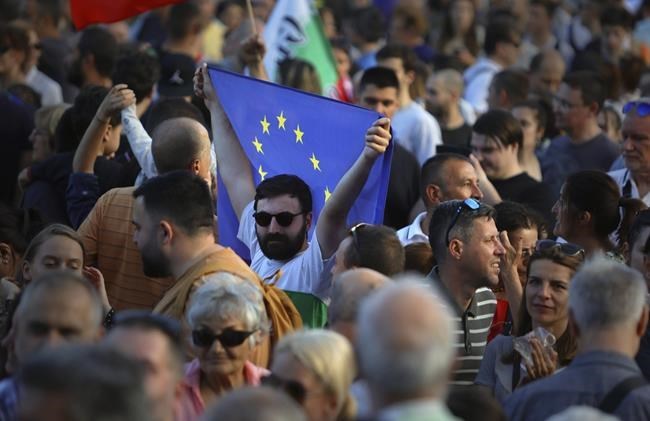SOFIA, Bulgaria (AP) — Lawmakers in Bulgaria on Wednesday approved a no-confidence motion against the country’s minority coalition government that could topple the centrist prime minister and further stall efforts by Balkan countries to join the European Union.
The center-right opposition party GERB filed the motion last week, accusing the government of mishandling public finances and economic policy and failing to tackle soaring inflation. The no-confidence vote passed 123-116 with no abstentions.
Just after the vote, Prime Minister Kiril Petkov pledged to continue to struggle for reform — his key campaign pledge — in the EU’s poorest member state.
“We promise that ... one day we will have Bulgaria without a mafia, a successful prosperous European country,” he said.
He later joined several thousand government supporters who converged near the parliament building in the capital Sofia.
Petkov, a Harvard-educated businessman, formed a four-party coalition government in December. He has pushed for a resolution to a bilateral ethno-cultural dispute that has blocked North Macedonia and Albania’s bids to join the EU. Bulgaria is a member of the EU and NATO.
Russia’s invasion of Ukraine on Feb. 24 has prompted the EU to consider to prevent Moscow from expanding its influence in the region.
Bulgarian President Rumen Radev will hold consultations with parliamentary parties that can try to form a new majority government. If that fails, he could install a caretaker cabinet before calling a parliamentary election, in what would be the country’s fourth such vote in little more than a year.
Bulgaria has blocked neighboring North Macedonia's bid to join the EU, and with it indirectly, Albania's as well. The Bulgarian government has insisted North Macedonia formally recognizes that its language has Bulgarian roots, acknowledges in its constitution a Bulgarian minority, and quashes “hate speech” against Bulgaria. North Macedonia has said that its identity and language aren’t open for discussion.
North Macedonia has held EU candidate status for 17 years and received a green light in 2020 to begin accession talks, although no date was set for the start of negotiations. Its president, Stevo Pendarovski, said last week that the delay has “taken a toll” on the nation.
The European Commission has made repeated promises that the future of six countries in the Western Balkans lies within the EU. amid divisions among member countries and some bilateral issues.
France, which currently holds the EU's rotating presidency, said it is making last-ditch efforts to clear the path before a Western Balkans summit scheduled for Thursday and Friday.
Clement Beaune, the French minister for European affairs, said the proximity of the war in Ukraine has put the onus on the 27-nation EU to “reinvigorate” in the Balkans.
He said the French government has “activated and reactivated talks” with both North Macedonia and Bulgaria, as well as other EU members.
“I have a hope that we will succeed, but work remains to be done," Beaune said.
Daniel Smilov, a political science professor at the University of Sofia, said that Petkov, Bulgaria's prime minister, has been a “driving force” in pushing for a resolution to the dispute with North Macedonia and that a collapse of his government could blunt that effort.
“It’s quite unfortunate for the North Macedonia situation because simply we don’t have a stable majority now in parliament to give the green light to an agreement,” he said. “And the French presidency has come up with a very reasonable deal.”
The French deal, which has not officially been made available to the public, was sent to both countries last week.
Petkov’s coalition had promised to clean up rampant corruption in the country. But the fresh crisis is now raising fears among some observers who say that it could lead to a rise in pro-Russia parties.
NATO member Bulgaria, which has historically close relations with Moscow, has strongly backed the west’s sanctions against Russia since it launched its invasion on 24. Feb. Petkov even dismissed his defense minister Stefan Yanev for calling the invasion a “special military operation,” the Kremlin-favored description for its war.
But observers believe that political instability will favor Bulgaria’s pro-Russia parties, notably the far-right Revival party which holds 13 seats in the country’s 240-seat legislature.
Ruslan Stefanov, program director at the Center for the Study of Democracy, a Sofia-based think tank, describes Revival as a small “but very thuggish, very vocal pro-Russian” party with a prominent social media presence that has stated that “Bulgaria should support Russia and not Ukraine.”
“They’ve also been very ... visible on the streets too ... Russia has sizeable influence in the country anyway, but new elections would strengthen the formal political representation of this influence,” he said, adding that it could “weaken the EU positions.”
—â¶Ä”
McGrath reported from Sighisoara, Romania. Samuel Petrequin in Brussels and Jovana Gec in Belgrade, Serbia, contributed.
Valentina Petrova And Stephen Mcgrath, The Associated Press


